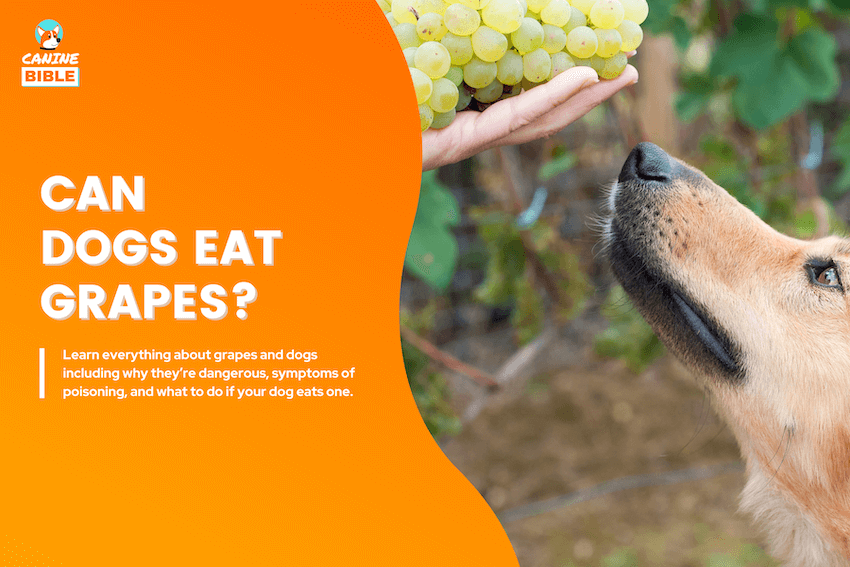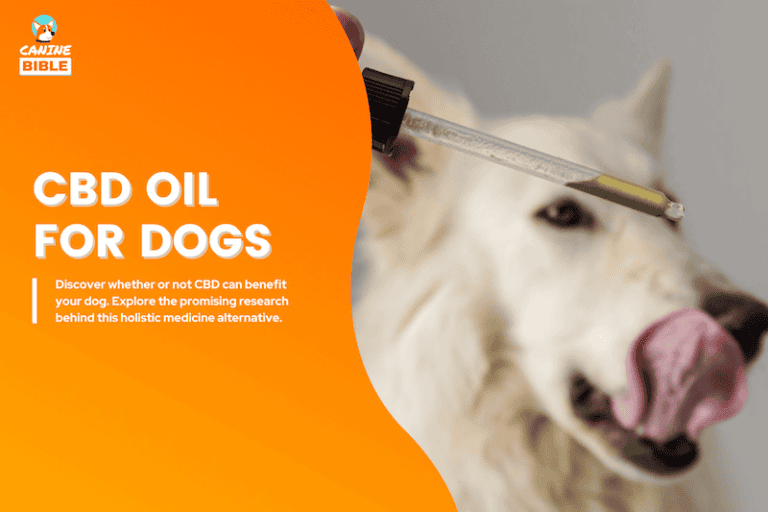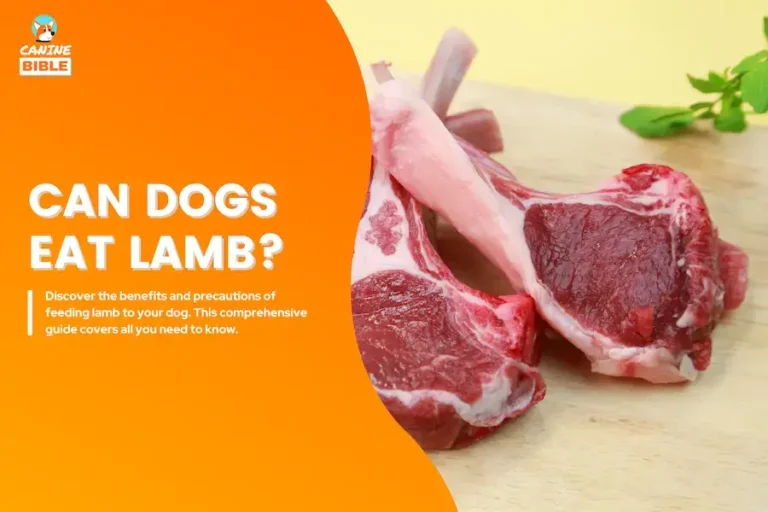Can Dogs Eat Grapes? Vet-Approved Answer & What to Do

Canine Bible is reader-supported. We receive affiliate commissions via some of our links. Learn more.
No, dogs should never eat grapes. While they may seem like a harmless and healthy snack, grapes—along with their dried counterpart, raisins—are highly toxic to dogs and can lead to severe health complications, including kidney failure. Even a small amount can be dangerous, and the exact toxic component remains unknown. But what about grape juice? Are certain breeds more susceptible? Can a single grape cause harm? This guide will explore the dangers of grapes, poisoning symptoms, and what to do if your dog accidentally eats one.
Are Grapes Good For Dogs?
No, grapes are not good for dogs. They are highly toxic and can be fatal. All types of grapes, including red, green, peeled, seedless, cooked, raisins, currants, and sultanas are dangerous for dogs.
Why Are Grapes Toxic to Dogs?
While the exact mechanism of grape toxicity in dogs is still not fully understood, recent research suggests that tartaric acid and its salt, potassium bitartrate, may play significant roles in causing kidney damage. These compounds are present in high concentrations in grapes and raisins, and dogs seem particularly sensitive to them.
Grape Components and Dog Safety
| Component | Description | Effects on Dogs | Safe for Dogs? |
|---|---|---|---|
| Unknown Toxin | Exact compound unknown but leads to kidney failure | Causes vomiting, lethargy, and kidney damage | ❌ Not Safe |
| Oxalates | Found in grape skins, can contribute to kidney issues | May lead to kidney stones or failure | ❌ Not Safe |
| Salicylates | Natural plant compounds found in grapes | Can cause gastrointestinal irritation and toxicity | ❌ Not Safe |
| Tannins | Present in grape skins and seeds | Can contribute to kidney and liver toxicity | ❌ Not Safe |
| Raisins | Dehydrated grapes, concentrated toxicity | Highly toxic even in small amounts | ❌ Not Safe |
| Grape Juice | Contains concentrated toxic compounds | Can cause acute kidney failure | ❌ Not Safe |
| Grape Seeds | Contain tannins and other harmful compounds | Potentially toxic, can contribute to organ damage | ❌ Not Safe |
What The Science Says
A study published in the Journal of Veterinary Internal Medicine investigated the effects of grape or raisin ingestion in dogs, focusing on acute kidney injury (AKI) and neurological manifestations.[1] Here are the key findings:
1. Acute kidney injury (AKI): All 15 dogs that ingested grapes or raisins developed severe AKI, with 5 dogs classified as grade 4 and 10 as grade 5.
2. Neurological signs: Approximately 73% (11 out of 15) of these dogs exhibited significant neurological symptoms, including: cerebellar, forebrain and vestibular signs. These neurological manifestations were prominent in some cases but did not correlate with the severity of azotemia (elevated nitrogen waste in the blood) or the presence of systemic hypertension.
3. Survival and recovery: Eight dogs (53%) survived the toxicosis, with five achieving complete neurological recovery. The causes of death in the other cases were unrelated to neurological issues.
4. Neuropathological examination: Post-mortem examinations of four dogs did not reveal any structural abnormalities in the central nervous system.
5. Comparison with control group: In a control group of 74 dogs with AKI from other causes, only 3% (2 dogs) displayed neurological signs, specifically seizures unrelated to their AKI. The survival rate in this group was 57%.
Toxic Dosage
The toxic dose varies widely among individual dogs. Some may start experiencing symptoms such as severe kidney damage after ingesting a small amount, while others appear unaffected. Reports suggest that even 0.1–0.7 ounces per pound of body weight can be dangerous, with raisins being more concentrated and potentially more toxic than fresh grapes. A dog’s Individual tolerance or other factors like size may influence the severity of the reaction.
Symptoms of Grape Toxicity
The following symptoms may indicate a bad reaction to grapes
Early signs (6–12 hours post-ingestion)
Progressive symptoms
- Dehydration (dry gums, excessive panting, weakness)
- Abdominal pain (dog may whimper or show discomfort when touched)
- Reduced urination (a sign of kidney distress or failure).
If untreated, ingestion can lead to irreversible acute kidney injury, which may cause death.
Immediate Actions if Your Dog Eats Grapes
Dogs showing worsening symptoms, such as blood in their vomit or stool, difficulty breathing, weakness, or collapse, should be taken to the veterinarian immediately.
1. Contact a veterinarian immediately: Even if your dog seems fine, contact your veterinarian or an emergency pet poison hotline right away. This includes services like the ASPCA Animal Poison Control Center or Pet Poison Helpline at 1-855-764-7661. If you can’t reach your vet, you can chat live with a veterinary professional via our online vet chat or video chat support (24 hours a day, 7 days a week). You can also schedule an at-home veterinary appointment with The Vets, a mobile veterinary service that provides at-home vet care nationwide for just about everything.
2. Do not induce vomiting without guidance: Avoid inducing vomiting unless instructed by a veterinarian. Inducing vomiting can sometimes worsen the situation if not done correctly.
3. Gather important information:.When speaking to a vet, provide:
- Quantity consumed (estimate if unsure)
- Time of ingestion (how long ago the grapes were eaten)
- Dog’s weight and breed (to assess potential risk)
4. Follow veterinary instructions: The vet may suggest monitoring at home, or emergency treatment at the clinic.
- Keep your dog calm and prevent them from eating anything else.
- Be prepared to transport your dog to the vet quickly if advised.
- Bring any remaining grapes or packaging to help the vet assess the situation.
How Veterinarians Diagnose & Treat Grape Poisoning
Veterinarians diagnose grape poisoning in dogs based on a history of ingestion, clinical symptoms, and diagnostic tests. Blood tests (serum biochemistry) assess kidney function by measuring elevated levels of blood urea nitrogen (BUN) and creatinine, while urinalysis helps determine if the kidneys are properly producing urine. Treatment focuses on rapid decontamination and kidney support. If ingestion was recent, vomiting may be induced, followed by administering activated charcoal to prevent further toxin absorption. Aggressive intravenous fluid therapy is initiated to maintain hydration and flush toxins from the kidneys, often continued for 48 hours. Additional supportive treatments, such as anti-nausea medications and diuretics, may be used to manage symptoms and stimulate urine production.
Regular monitoring of kidney function through bloodwork and urine output is essential, and dialysis may be necessary in severe cases. Early intervention significantly improves outcomes, but if acute kidney failure develops, the prognosis becomes more critical.
Estimated Vet Bill for Grape Poisoning Treatment
| Treatment/Service | Estimated Cost (USD) |
|---|---|
| Emergency Vet Visit & Examination | $100 – $250 |
| Inducing Vomiting (if needed) | $50 – $100 |
| Activated Charcoal Administration | $40 – $80 |
| Blood Tests (Kidney Function Panel) | $100 – $250 |
| Urinalysis | $50 – $150 |
| IV Fluids (24–48 Hours of Therapy) | $500 – $1,500 |
| Hospitalization (Per Day) | $300 – $800 |
| Medications (Anti-nausea, Diuretics, etc.) | $50 – $200 |
| Extended Hospitalization (if kidney damage occurs) | $1,000 – $3,000+ |
| Dialysis (if required in severe cases) | $3,000 – $6,000+ |
Total Estimated Cost:
- Mild Cases (Early Intervention): $300 – $800
- Moderate Cases (IV Fluids + Monitoring): $1,000 – $2,500
- Severe Cases (Hospitalization, Dialysis, Kidney Failure Management): $3,000 – $8,000+
💡 Pet insurance consideration: If a dog has pet insurance, some costs may be covered, but owners should check their policy details. Without insurance, emergency vet care can be costly. We recommend getting pet insurance for financial protection against unexpected medical emergencies, ensuring your pet receives the best possible care without the burden of high out-of-pocket expenses. Check out our best pet insurance guide to find a suitable plan for your pet.
At-Home Tests & Prevention Tips to Avoid Poisoning Dogs
Safe Alternatives to Grapes
Here’s a list of alternatives to grapes that are safe for dogs
Frequently Asked Questions
The Bottom Line
Dogs should never eat grapes—in any form, quantity, or variety. Grapes and raisins are known to cause acute kidney failure in dogs, and since the exact toxic compound remains unknown, there is no safe amount for consumption. Even if a dog has eaten grapes before without an apparent reaction, they can still suffer life-threatening effects in the future. Prevention is key—always store grapes out of reach, educate family members, and ensure your dog only consumes safe, vet-approved foods. If your dog accidentally eats grapes, contact a veterinarian immediately, as early intervention is critical for preventing severe health complications. If you’re looking for other healthy snack options, check out the best dog treats to find safe and nutritious alternatives.
Sources
Canine Bible authorship represents the unified voice of our entire editorial team and our in-house veterinarians rather than a single author. Each article, blog post, and review published under the Canine Bible name undergoes a rigorous review process, involving all team members to guarantee accuracy and up-to-date in accordance with the latest veterinarian research. This collaborative effort is an integral part of our editorial process and aligns with our four pillars of content creation. This approach ensures our content is backed by expert knowledge and factual information, offering our readers reliable, actionable, and trustworthy content.







